Fleet Maintenance Facilities Careers
Requirements
- Grade 12 education (or an equivalency) in accordance with provincial standards; and
- Canadian citizenship.
Apprenticeship Salary
The Department of National Defence offers competitive wages. You will start at 50% of your final salary, and will receive a 5% raise every six months.
Benefits
The Department of National Defence offers a competitive compensation package which includes:
- Competitive wages;
- Health Care, Dental Plan, and Life Insurance;
- An attractive pension plan; and
- Comprehensive leave package.
Fleet Maintenance Facilities are 2SLGBTQI+ positive workspaces
Apprenticeship Manager: (250) 363-2367
Machinist
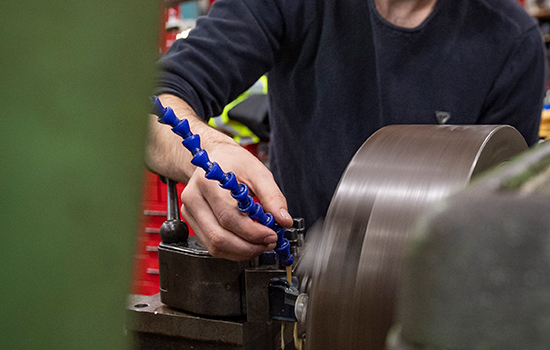
If you are a hands-on learner, motivated by a wide range of mechanical challenges in a variety of industrial work settings, a Machinist Apprenticeship could be the right path for you. We can offer you a unique occupation that is challenging and rewarding.
What does a Machinist do?
A machinist uses specialized tooling to create precision parts in metals and plastics. As a machinist, you will receive a unique Apprenticeship, experiencing hands-on training in the following areas:
- Machining
- CNC Programming
- Mechanical Fitting
- Plant Maintenance
- Surface and underwater weapons
You will also learn about:
- CAM software
- Engraving
- Water Jet system
Metal Fabricator
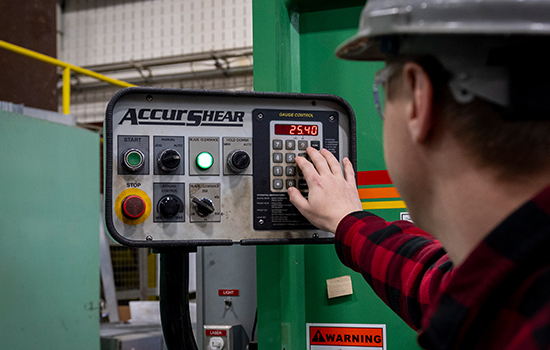
If you want a hands-on career in the trades, Metal Fabrication is the path for you. We can offer you a unique occupation that is challenging and rewarding.
What does a Metal Fabricator do?
As an Apprentice in Metal Fabrication, you will get hands-on training from experienced Journeypersons. They will provide instruction in the following areas:
- Maintenance and repair of surface and subsurface ships
- Custom fabrication
- Design and layout
- Working in conjunction with other trades to obtain results
- Supporting the Fleet and shore establishments
You will also learn about:
- Blueprint reading
- Fabrication using all types of metals
- Submarine maintenance and repair procedures
- Foundry work
- Blacksmithing
- CNC Equipment
Painter

Do you have good manual dexterity? Are you comfortable with heights and confined spaces? Do you enjoy keeping up with new trends in the painting field? We can offer you a unique occupation in painting that is challenging and rewarding.
What does a Painter do?
Painters are responsible for maintaining many parts and equipment on warships and submarines, from painting the ship’s hull to coating pipes in the bilge. Our Painters are trained in different types of paint and application techniques. They also learn to operate spray booths, including advanced powder coating systems. Additionally, you will get hands-on experience with our cutting-edge Graphics Department and stay up to date with the latest painting technologies.
You will receive instruction in the following areas:
- Varied coating systems and methods
- How to properly distinguish product data
- Airless spray painting
- Basic ship systems and operations
During your time in the Graphics Department, you will learn about:
- Basic design and layout
- Hand lettering and striping
- Editing and printing practices
- Blueprint reading and layout
- Computer skills using graphics software
Shipwright/Joiner

Are you interested in woodworking? Do you enjoy working outside? Are you comfortable with heights and confined spaces? We can offer you a unique occupation as a Shipwright that is challenging and rewarding.
What does a Shipwright/Joiner do?
A Shipwright is responsible for woodworking, cabinet making, crate building, and acoustic tile application. You will also use transit techniques, plumb bobs, tapes, and levels to dry dock naval vessels while adhering to predetermined docking plans and blueprints.
Our apprentices gain a comprehensive skillset and become well-prepared for a proactive and fulfilling career.
You will receive instruction from trained journeypersons in the following areas:
- Use of specialized hand and power tools
- Scaffolding construction
- Use of state-of-the-art CNC Router
Rigger/Sailmaker
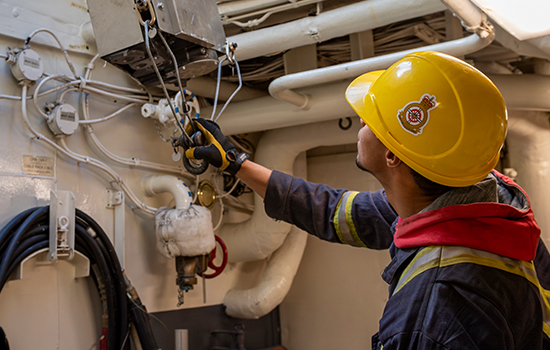
Are you a hands-on learner, motivated by a wide range of mechanical challenges in a variety of industrial work settings? We can offer you a unique Rigger/Sailmaker occupation that is challenging and rewarding.
What does a Rigger/Sailmaker do?
Rigging is the oldest maritime trade related to shipbuilding and repair. As a Rigger/Sailmaker Apprentice, you will receive hands-on training from experienced Journeypersons. They will provide instruction in the following areas:
- Manufacturing steel wire and fibre rope products
- Working alongside other trades
- Lifting and removal of parts from surface and submarine vessels
You will also learn about:
- Fabrication and repair of wetsuits, rescue crafts, life rafts, rigid hull inflatable boats, upholstery, and weather covers
- Blueprint reading and layout
Electrician

If you want a hands-on career in the trades, an Electrician Apprenticeship may be the path for you. We can offer you a unique occupation that is both challenging and rewarding, with opportunities to further develop your career.
What does an Electrical Apprentice do?
As an Electrical Apprentice, you will receive hands-on training from experienced electricians as you cycle through the electrical shops. They will provide instruction in the following areas:
- Propulsion, control, and generation
- Various test equipment
- Power generation and distribution
- Cabling
- Electrical Warfare systems
- Fire detection
- Machinery control systems
- Motor repair, rewinding and overhauling
- DC & AC systems
- Submarine electrical systems
Electroplater

If you are looking for an active career in technology and want to keep up with new trends in the electroplating field, we can offer you a unique occupation that is both challenging and rewarding.
What does an Electroplater do?
Electroplater Apprentices get hands-on training in all aspects of metal finishing. From the initial cleaning to the finished product ready for assembly, electroplaters are vital to the functioning of the equipment. We use either metallic or non-metallic coatings to ensure the longevity of structures and equipment onboard naval vessels.
You will also learn about:
- Chemical cleaning
- Various metal plating system
- Waste treatment system operations
- Anodizing of aluminum
Please note: This trade is unique to the West Coast; however, similar roles or trades may exist on the opposite coast.
Millwrights

Millwright Apprentices gain hands-on experience onboard surface and subsurface naval vessels. We can offer you a unique occupation that is both challenging and rewarding, with opportunities for career growth.
What does a Millwright do?
Millwright Apprentices learn to use state-of-the-art technology while working alongside experienced Journeypersons. While you rotate through the various shops, you will gain a comprehensive skillset that will guide you through a successful career.
Millwrights are responsible for installing, maintaining, repairing, and troubleshooting stationary industrial machinery and mechanical equipment.
At our facilities, Millwrights perform these tasks on ships and submarines while docked, as well as on equipment inside our facility.
You will also learn about:
- Hydraulic systems
- Compressors and pumps
- Weapons systems
Electronic Technician

If you want a hands-on career in the trades, an Electronic Technician Apprenticeship is the path for you. We can offer you a unique occupation that is challenging and rewarding.
What does an Electronic Technician do?
As an Electronics Apprentice, you will gain hands-on training from experienced technicians while cycling through the different shops at our facilities. During this time, you will learn from experienced Journeypersons. They will provide guidance as you:
They will provide guidance as you:
- Learn about electronic systems on naval vessels
- Install, overhaul, and repair electronic equipment
- Work in conjunction with other trades to obtain optimal results
You will also learn about:
- Computers and networking
- Various test equipment
- Communication systems
- Satellite systems
- Electronic Warfare systems
- Navigational aids
- Sonar systems
- Gyroscopes
- Weapons systems
Marine Insulator/Lagger

If you are team- and safety-oriented, interested in working with your hands and machinery, and can work at heights and in confined spaces, we can offer you a unique occupation that is both challenging and rewarding.
What does a Lagger do?
The Marine Insulator/Lagger is responsible for measuring, cutting, and fitting a variety of insulation materials to the many systems found onboard Navy vessels. As an Apprentice, you will receive hands-on training from experienced Journeypersons associated with these applications.
They will provide instruction in the following areas:
- Applying insulation materials to pipes, valves, ducting, exhaust systems, bulkheads, deckheads, and a variety of pressure vessels
- Methods of soundproofing and fireproofing
Apprentices will gain extensive knowledge in acoustic, thermal, and mechanical insulation application in a state-of-the-art fabrication facility designed to provide service in everything from the coldest refrigeration systems to the hottest exhaust piping and machinery.
Pipefitter
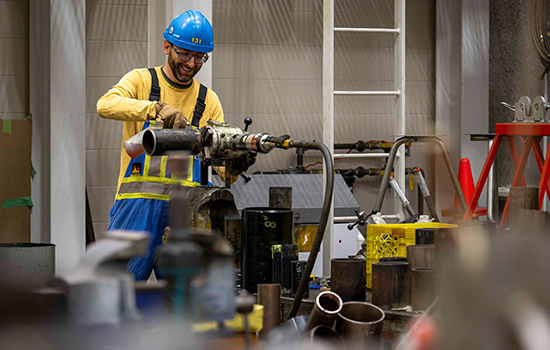
If you want a hands-on career in the trades and are motivated by a wide range of mechanical challenges in a variety of industrial work settings, we can offer you a unique Pipefitter Apprenticeship that is both challenging and rewarding.
What does a Pipefitter do?
Pipefitter Apprentices perform preventative maintenance to ensure systems—from high-pressure air to cooling water—are running and repaired as required. Using the latest technology and equipment, our apprentices gain a comprehensive skillset to:
- Bend, braze, and thread pipe to fabricate materials required to maintain the Fleet
- Remove and install interference pipes, and test systems before bringing them back into operation
Your apprenticeship and career will:
- Provide constant learning opportunities
- Constantly evolve with technology
Refrigeration

If you want a hands-on career in the trades and are motivated by a wide range of mechanical challenges in a variety of industrial work settings, we can offer you a unique occupation that is both challenging and rewarding.
What does a Refrigeration Apprentice do?
A Refrigeration Apprentice will be taught controls, thermodynamics, brazing, tube bending, pneumatics, proper refrigerant handling, and electrical and mechanical troubleshooting.
Refrigeration is used on many different systems and for diverse applications within the Canadian Forces.
You will receive hands-on training in the following areas:
Onboard vessels:
- Cooling specific hydraulic and radar systems
- Food and preservation/air conditioning onboard vessels
- Cool water loop distributed to equipment throughout the vessel
Within FMF:
- Freezers/oil coolers
- Chemical processing
- System troubleshooting and decommissioning
Instrument Mechanic

Do you enjoy taking things apart and putting them back together? Making parts for items you are repairing? Do you enjoy measuring and testing to ensure these items are functioning correctly? We can offer you a unique occupation that is challenging and rewarding.
What does an Instrument Mechanic do?
An Instrument Mechanic’s responsibilities involve a variety of technical work, such as repairing night vision goggles, binoculars, periscopes, radar units, and high-tech cameras. This career involves machining parts to repair these items and even assisting in the removal of attack periscopes from submarines.
An Instrument Mechanic Apprentice initially follows the training of a Machinist Apprentice. Machining Apprentices experience a variety of mechanical training:
- General machining
- CNC machining
- Tool and die machining
- Engraving
- General marine fitting
- Heavy duty fitting
- Weapons fitting
You will also learn about a large range of specialized machines such as lathes, milling equipment, saws, and grinders to manufacture any kind of part..
A machinist apprentice interested in becoming an instrument mechanic has the option to complete at least part of their duties in the instrument shop during the final year of their apprenticeship.
Please note: This trade is unique to the West Coast; however, similar roles or trades may exist on the opposite coast.
Sheet Metal
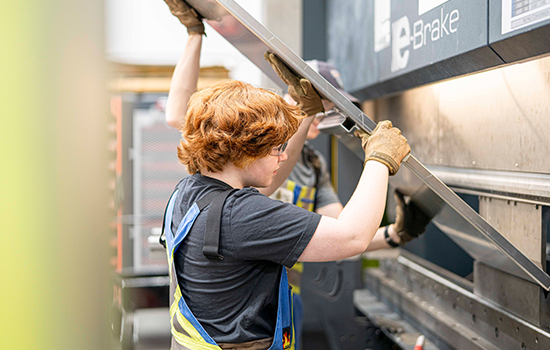
Sheet Metal Apprentices gain hands-on experience onboard surface and subsurface naval vessels. We can offer you a unique occupation that is both challenging and rewarding, with opportunities for career growth.
What does a Sheet Metal Worker do?
Sheet Metal workers design, fabricate, assemble, install, and repair sheet metal products. Sheet Metal Apprentices learn to use state-of-the-art technology while working alongside experienced Journeypersons. As a result, you will gain a comprehensive skillset that will guide you through a successful career.
Specific components of Sheet Metal apprenticeship include:
- Using drafting and layout techniques to design and fabricate various products
- Cutting and forming metal using various types of equipment
- Removing and installing various systems onboard HMC Ships and submarines
Welder

Welder Apprentices gain hands-on experience onboard surface and subsurface naval vessels. We can offer you a unique occupation that is both challenging and rewarding, with opportunities for career growth.
What does a Welder do?
A welder joins or severs metals in beams, girders, vessels, piping, and other metal components. They make metal parts used in repair and maintenance and weld parts, tools, machines, and equipment.
Welder Apprentices learn to use state-of-the-art technology while working alongside experienced Journeypersons. As a result, you will gain a comprehensive skillset that will guide you through a successful career.
Marine Survival Technician/Sail Loft

Are you a hands-on learner, motivated by a wide range of mechanical challenges in a variety of industrial work settings? We can offer you a unique Marine Survival Technician/Sail Loft occupation that is challenging and rewarding.
What does an Marine Survival Technician / Sail Loft do?
Maintenance and certification of life rafts and life jackets, as well as the maintenance of canvas, fabric, and vinyl components and materials—including upholstery and furniture.
During your apprenticeship and career, you will:
- Work on submarine escape suits, wet and dry diving suits, inflatable boats, hydrostatic release units, damage control suits, diver training suits, decoys, fenders, high-pressure (HP) air cylinder operating heads, and all related marine survival equipment
- Develop and interpret drawings, sketches, templates, and patterns associated with fabric manufacturing
Please note: This trade is unique to the East Coast; however, similar roles or trades may exist on the West Coast.
Chemical Cleaning/Metal Finishing
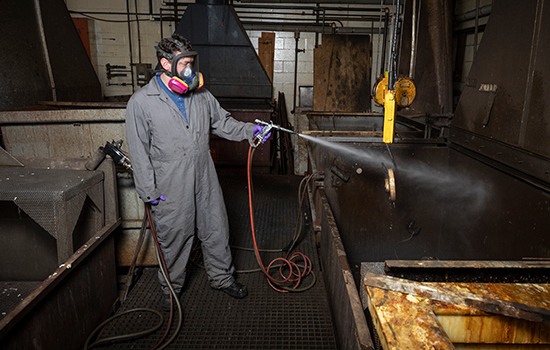
If you're looking for an active career in technology and want to stay up to date with emerging trends in the chemical cleaning and metal finishing field, we offer a unique occupation that is both challenging and rewarding.
What does a Chemical Cleaning / Metal Finishing Technician do?
Chemical Cleaning / Metal Finishing Apprentices receive hands-on training in all aspects of metal finishing. From the initial cleaning to the finished product ready for assembly, metal finishing is vital to the function and longevity of naval equipment. Technicians apply metallic or non-metallic coatings to ensure the durability of structures and systems on board naval vessels.
You will also learn about:
- Chemical cleaning
- Safe laboratory practices
- Various metal plating systems
- Waste treatment system operations
- Anodizing of aluminium
Please note: This trade is unique to the East Coast; however, similar roles or trades may exist on the West Coast.
Crane Operator/Forklift Operator
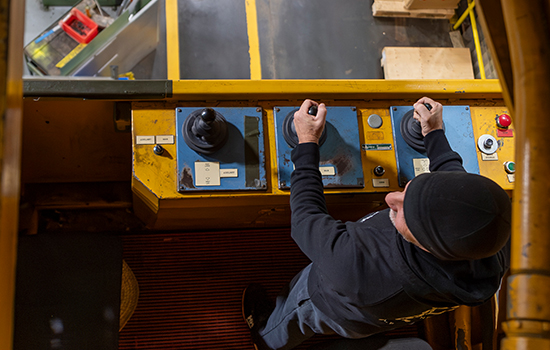
Do you enjoy working at heights, operating precision equipment, and collaborating with multiple trades? Are you interested in moving equipment and materials on and off ships or between various locations? Do you enjoy using measurements and testing to ensure items are moved safely and correctly? We offer a unique occupation that is both challenging and rewarding.
What does a Crane Operator do?
Crane Operators learn how to operate and maintain mobile and jetty cranes with capacities of up to 110 tons.
You will also learn about:
- Marine slipways / railway systems up to 200 tons
- Shuttle pull cars (up to 220,000 lbs)
- Vessel syncrolift systems (up to 10,000 tons)
Finance

If you are organized, detail-oriented, interested in problem solving, and enjoy working with people, we can offer you a career that is challenging, rewarding, and grounded in continuous learning.
What does Finance do?
Finance works closely with stakeholders to meet the financial objectives of the Unit while making the best use of its financial and human resources. Finance offers services in:
- Accounting
- Financial planning and performance
- Budget monitoring and reporting
- Financial policy and compliance
Engineering

If you like to apply theory and technical experience to ensure optimal system performance, and are interested in solving complex system issues, we can offer you a career that is challenging, rewarding, and grounded in continuous learning.
Our Engineers and Technologists work across all Naval technologies:
- Naval Architecture
- Materials
- Electrical power generation
- Mechanical systems
- Control systems
- Computer networks
- Communication systems
- Navigation systems
- Electronics (Radar, Sonar)
- Weapons systems
- Non-destructive Testing
- Technical data management
What does Engineering do?
We are the In-Service Technical Subject Matter Experts for warship and our activities include:
- Engineering Changes Development and Audits - adding new capability to ships, assessing configuration
- Trials and Condition Based Assessments - assessing system performance
- Tech Advice to support:
- Certification
- Technical Readiness
- System Risk Analysis
- Technical Policy/Procedure development/review such as Trial Agendas, Maintenance Plans, Set-to-Work routines
- System sustainability/availability recommendations:
- Obsolescence management recommendations
- Unsatisfactory condition reports
- Capability Deficiencies
- Project Support – Requirements definition, Acceptance Trial support
- Data Collection and Analysis
- Technical Investigations – for atypical fault modes to determine root cause
- Job Instructions – for complex or critical system repair instructions
- Ship Staff and Production guidance and knowledge transfer
Administration

If you are highly organized, enjoy working with people, and thrive in a fast-paced environment, we can offer you a dynamic and rewarding career in administration.
What does an Administrator do?
Administrators are the backbone of any organization, ensuring that operations run smoothly and efficiently. Our administrative professionals support teams across departments by office support services, coordinating travel or training, and maintaining or processing essential documentation. As an administrator, you’ll gain hands-on experience with office software and develop a strong foundation in organizational procedures and professional communication. This role is ideal for individuals who are detail-oriented, adaptable, and eager to contribute to the success of a team.
Opportunities include:
- Travel and Training: Managing travel bookings, training records, and compliance documentation
- Security: Assist with personnel security screening, and incident reporting
- Workforce Management: Supporting onboarding, and workforce data management
- Technical Library: Maintaining technical manuals, digital resources, and reference materials
- HR Strategy and Culture: Supporting staffing activities, recognition programs, and workplace wellness initiatives